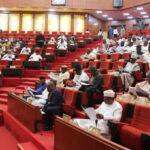
This launch followed several complaints by passengers about ticket racketeering amidst other unethical practices.
The Minister of Transportation, Saidu Alkali, speaking at the official launch of the E-ticketing platform held at the ministry headquarters in Abuja, said the government is ready to improve its revenue by utilising all internally generated revenue through technology channels available to it.
He said the platform was launched to improve access to transportation services, end ticket racketeering and eliminate revenue leakage.
He revealed that the e-ticketing platform would take effect from November 1st, 2023 and can be accessed via https://nrc.tps.ng.
The minister said, “The essence of E-ticketing is to make it easy for our passengers to buy tickets, for security purposes and to stop ticket racketeering. it will also ensure the security of our passengers onboard the train and avoid racketeering.
“From Wednesday, November 1st, Nigerians will enjoy the benefit of buying tickets at their own convenience and without any issues.”
On his part, the Managing Director of the Nigerian Railway Corporation, Fidet Okharia, stated that the initiative had increased its weekly revenue on the Warri-Itakpe route to N28 million.
“I am so happy about this project, apart from the fact that e-ticketing will end issues of ticket racketeering, it will also increase the revenue from the routes. This means by the time e-ticketing commences, there is a likelihood that our revenue will increase.
“I can also announce that for the fear of the e-ticketing coming, we can see our revenue growing. I can boldly say that throughout last week, we didn’t earn anything less than N4m a day on the Itakpe Warri route,”
“I am certain that with this launch, I will stop receiving calls on why my staff are cheating Nigerians,” he stated.
The NRC DG restating his commitment to end unethical practices revealed that 14 persons have been heavily sanctioned for ticket racketeering.
The PUNCH reports that the contract for the E-ticketing of the rail routes was approved by the Federal Executive Council in May 2023 at the cost of N1.96 billion with an expected revenue of N176bn in ten years.




